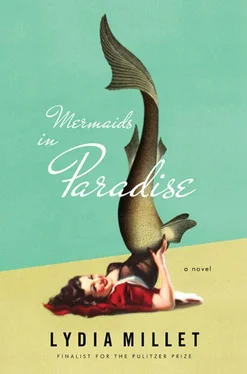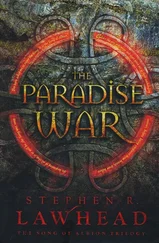And damned if he didn’t reach into a zip compartment on his roller bag and pull out a UK passport. The thing was red, with a gold crown on it and a couple of royal-looking animals standing up on hind legs. Seemed like the real deal. I’ve known Ellis a long time, and I still have no idea how he got his hands on it.
Anyway, we figured there was no harm letting him waste his time with embassies or whatnot. There were none on the island, that was for sure.
The group had decided no one should use words like murder or homicide , when one of us talked to Nancy’s family. Those words were not comforting words, and the truth was, without any cops to talk to, without having even seen the body (except for Steve, who’d seen it covered in a sheet) we didn’t actually know shit. Once Gina had a number for Nancy’s parents, which she accomplished with a speed that impressed me (“Failed academics run in families. Turns out her old man’s a professor too”), we decided Chip would make the call. He’d been the closest to Nancy by far, and Chip, when he wants to, can be tactful.
He needed privacy for the call, he said, so we let him out onto the balcony, where he fortified himself with a few swigs from a dewy beer before connecting.
Meanwhile Miyoko had started getting Tokyo celebrities on board; she also had ties to some American actors and rock stars, she told us, a lot of them did lucrative commercials in Japan, for perfume and jewelry and clothing, and she’d interviewed some of our A-listers now and then. Still, they weren’t her best buds so getting through their handlers would take some time, she said. But she was up for it. She didn’t have many ins with scientists or government officials, but pop-culture famous people were her stock in trade.
Gina and Chip would handle the scientist angle, Gina being in the academy herself and Chip having had Nancy’s ear. Rick would try to schmooze the wealthy, since, as an independent filmmaker, he knew quite a few of them. Plus his money contacts had friends among the nationally prominent Democrats, since many made sizable contributions to political campaigns. He’d handle that angle, and Ronnie would help him. Thompson insisted he could pull strings, that he’d call on some old friends still on active duty; he’d try to put together some military might for us, he said, though what he meant we weren’t entirely sure.
There they were, all on cell phones, all frantically dialing and talking. And then there were the rest of us, with no contacts at all. The best Steve could do were some astronomers in Palo Alto, who wouldn’t be much help. They were preoccupied, he said, didn’t have an interest in marine biology: their eyes were fixed on the heavens.
Janeane and I also had nothing.
So Steve, as a therapist (though apparently he didn’t practice anymore) and therefore a de facto interpersonal specialist, would try to do some coalition-building, visit some places of business and government locally, trying to reach out to the year-round community. He’d be armed only with a tablet and our footage, and he’d try to garner local support for a mermaid sanctuary.
We didn’t have high hopes for that part of the outreach, but it was a nice time-killer for Steve, who, like Chip, enjoyed meeting people, whoever they might be. He didn’t feel great about going out alone, but Thompson said he could drive the Hummer and I think the novelty may have encouraged Steve a bit.
Janeane and I were relegated to the menial jobs: Janeane was in charge of keeping us fed and watered, and I — well, I had the lowest task of all. I had to tweet.
Miyoko had several million followers, but they followed her in Japanese. So we established a mermaid-group handle linked to the Facebook page she’d set up, plus the footage of us on the beach, and I tweeted from that. I’d never tweeted before, but it’s not rocket science and I’m a quick study. At first the tweeting was slow-going, but soon enough, with Miyoko’s input, I gained a following for us. Re-tweets were everywhere.
We saw the TV tape on YouTube, our confrontation with the suits and the soldiers, the Japanese TV broadcast. I didn’t like the feeling of watching myself on TV — the shapeless garment I sported was a blot on the landscape. A lifetime of good dressing went out the window; now I was immortalized wearing Janeane’s floral quasi-muumuu.
Gina took my hand, the first time we saw that footage, and squeezed it in terrible sympathy. I would have cried, if I’d had the time and energy. But there was no pause to allow for tears, and the milk was already spilt. The world now knew me as a muumuu woman. I looked like Janeane.
Before long the personal calls and texts started rolling in to my cell phone. I ignored them all — people from work, friends, even B-school people I hadn’t heard from in years. There were three calls from Chip’s mother alone.
Chip ignored his calls too; the long conversation with the Simonoff family — Nancy’s mother, to be specific — was draining. As it turned out, the family had known something was terribly wrong, because someone unfamiliar had answered Nancy’s cell phone when her mother called to check in. That person had said Nancy wasn’t available and not to call again, then promptly hung up. When the father called back (by then the mother was too distraught), no one picked up, so they called the resort and were put through to Guest Services, where they were given the run-around. As a result, the father was already en route to us. Worried sick about Nancy, he’d simply gotten on a plane.
When Chip broke the news to Nancy’s mother about what seemed to have happened, the woman went into shock. It took a while to get her back on the phone, at which time, without prompting from Chip, she brought up the possibility of foul play. Nancy’d had her inhaler since she was in preschool and there was no way, her mother said, she would have failed to use it. She always had extras, too: she was always stocked to the gills.
The family had heard about the mermaids from Nancy before they ever saw the video — they’d been the first ones she called. Nancy had never been a liar or one whit fanciful, they said, on the contrary, she’d always been painfully literal. She had no interest in movies, except for documentaries on marine life; she never played non-educational games or read make-believe stories, and she abominated the frivolity of novels. When other girls dressed up as princesses for Halloween, she put on a snorkel mask and went as Jacques Cousteau. (And once as a blowfish, her mother admitted, which set off a bout of weeping that called for a phone handoff to a neighbor and delayed the conversation another twenty minutes.)
The parents had retired to Florida when the father went emeritus, so it was a short flight and Prof. Simonoff was due in shortly. Chip’s new directive was to keep him from falling into the clutches of the parent company. He’d meet him at the ferry, and this time there’d be no interception from the marine police: we were the only ones who knew he was coming. And not only was the Prof. coming, Nancy’s mother had told Chip, but he was bringing some medical expertise with him — a doctor friend from their retirement community. You never knew when that might come in handy.
The problem was, the armada was still out there. As far as we knew, they were moving full steam ahead with their plan to cordon off the mermaids and “bring them in.” The way we saw it, none of our activities, no part of our energetic bustle was going to bear fruit in time to stop it. We needed an injunction, a court order that would make them cease and desist their mermaid-corralling activities. And that was something we didn’t have.
Time flew that day, with many of us doing video interviews as well as phone — I made sure to shed the muumuu, now that I had access to my own clothes again — and a couple of meltdowns, like when Janeane first saw (against Steve’s explicit wishes) the beach footage, complete with soldiers/guns. She barricaded herself into the bathroom and we had to call in Steve, who was making his rounds in the Hummer, to lure her out again.
Читать дальше












